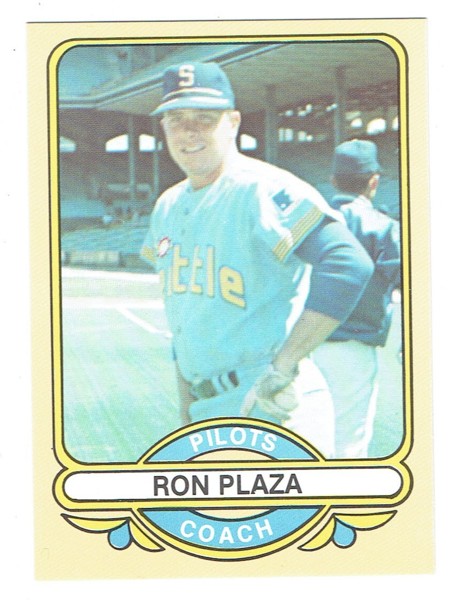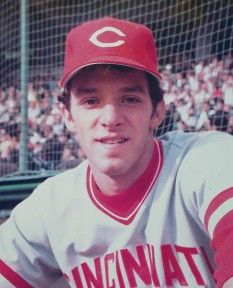
Outfielder and New Jersey native Mickey Duval was signed in 1974 by the Reds from a tryout camp. He faced a long, hard road to the big leagues. He got as far as AAA with Indianapolis, but a shoulder injury effectively ended his playing career.
I talked with Mickey and his wife, Michelle, during the 1975 Eugene Emeralds reunion in Las Vegas. He has no regrets about his baseball career, and he’s grateful for the impact that Michelle, his father, and two of his managers had on his life.
As we sat down to talk, Mickey saw that I had his page from Baseball-Reference.com on my computer screen.
Mickey Duval You got my stats up there! [To Michelle] Hey, he’s got my stats! [laughs]
Jim Haught Yep! I try to do my homework and be prepared.
Michelle Duval I’ve heard it all! [laughs]
JH And you’re still together! Amazing! [laughter from all]
MiD I didn’t know him then, so … we’re all good now.
JH So you got signed when you were 20 years old, right?
MD I graduated in 1973. I went to college in 1974. Then in 1975 is when — so I wasn’t drafted.
JH Did you sign out of a tryout camp?
MD Yeah. One person – actually, two people — made it. Because I was going to Morris County Community College in New Jersey. I lived with my coach.
Coach wanted me so bad right out of high school, and then he said, you know, I couldn’t go to anywhere else because of my grades; they weren’t there. And the guy from Seton Hall wanted me, but I didn’t have the grades.
JH So junior college was the way to go.
MD Junior college, and then I was gonna transfer to Seton Hall. But now, we had a kid in Bloomfield who was pitching in 1974. He was really good. And we were playing against him, and I just crushed him. I close my eyes and I can hit the ball off this guy; don’t ask me why.
And then the Reds, the Cubs, White Sox, and the Pirates’ scouts were there to watch this kid. And then all of a sudden, and I always told Michelle, I said, you never know who’s watching you. And the next thing you know, I get a call from two of them – the Pirates and the Reds. And I said, first one who wants me, I’m going with.
So Joe Caputo was the scout [for Cincinnati], and he said, hey, we’ll take you out for dinner, and talk to you a little bit about maybe going to spring training. I said, yeah, okay. Took me to dinner.
Next thing I know, he said, hey look, we’re going to give you a hat, give you some spikes, plane ticket, a couple of bucks; want to go to Tampa next year? I’m there. And that’s how I got signed. So I was just a free agent.
JH Were you always an outfielder?
MD Always. I played center field since I was eight years old. I always played outfield.
JH So you weren’t the classic guy who played short and hit third all the time?
MD No, no. My father brought me to Yankee Stadium in 1962; Mickey Mantle was playing, and he was in center field. And that’s why my name is Mickey. My real name is Michael. He named 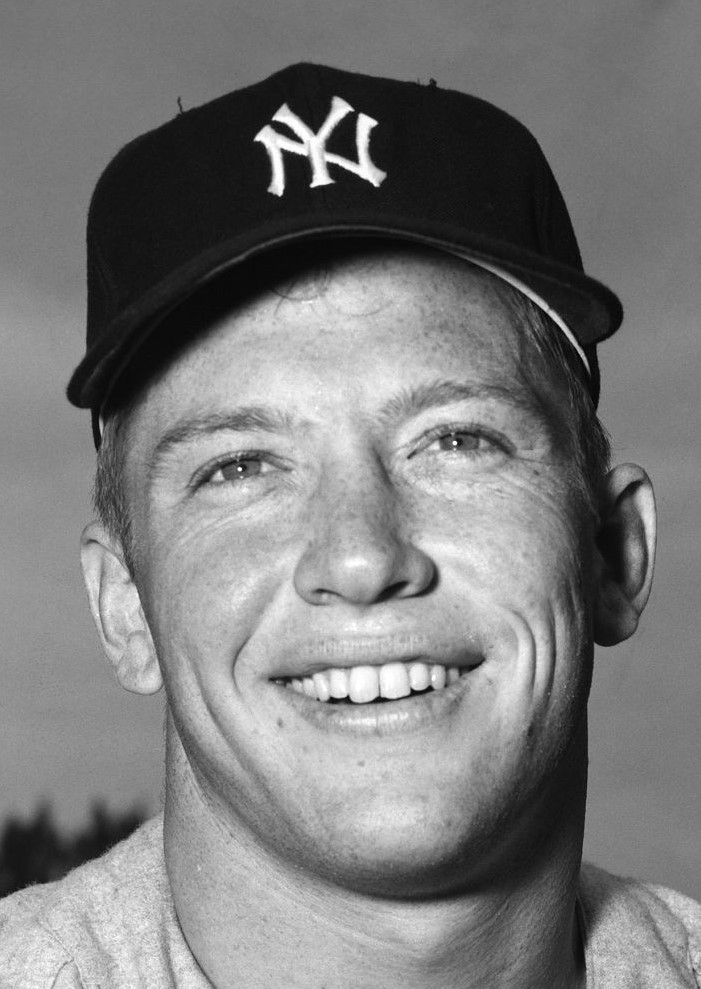 me after Mickey Mantle. So I used to go Yankee Stadium with him. And back then, I used to ask my father, can I go to the dugout now?
me after Mickey Mantle. So I used to go Yankee Stadium with him. And back then, I used to ask my father, can I go to the dugout now?
He goes, just wait. Go to the dugout now? Let’s wait a minute. Next thing you know, Mickey Mantle, Roger Maris, and Tom Tresh are coming in. He goes, okay, go! Boom, I jump on the dugout: Mick! Mick! And he went like this to me [waves], and I just — that was it. I said, I’m playing center field for the rest of my life.
And that’s what I did. I played some left and right, too.
JH So you played all three outfield spots, basically?
MD Yeah. Well, I played center field, when I was in high school, I actually sat the bench in my junior year in high school.
JH Your junior year?
MD Yeah, I wasn’t big enough or strong enough. But my father said, Don’t worry. You got more talent than all of them put together; you’re just not big enough and strong enough yet. So you got to do something.
JH Did you just need one more growth spurt?
MD Yeah. I grew from my junior year — to my senior and my college, I grew about five inches, put on about 30 pounds. And next thing you know, I had all the ability, and now it just came in.
JH Is that the way the family history went, that you grew later than other kids did?
MD All my brothers and sisters are tall. We all grew late. It was just a family thing. I was like 126 pounds, 5’7” when I was a junior in high school. I could do it all, but just wasn’t big enough and strong enough. And then all of a sudden, I just got there.
JH Did the year of junior college help you as a ballplayer?
MD Oh yeah! I had Coach Kiernan. He was very good coach and it was just a nice level up. It really –
JH Kind of got you ready?
MD Yeah, yeah, yeah. Because these pitchers are a lot better; you were facing a lot better pitching. So yeah, it got me ready, pretty much.
And ready he was! He reported to Eugene, Oregon for his introduction to pro baseball in the spring of 1975 with the Emeralds and manager Greg Riddoch.
JH So I gather the basic Eugene outfield was Lynn Jones and you and George McPherson? From looking at the stats, that’s where most of the starts were.
MD Yeah. And I usually played center field, right field – wherever Greg put me. It didn’t make any difference, but I played center field a few times. I played right field a few times, sometimes left.
With Mick, George and Lynn in the outfield, I’m not sure how anybody got on base — unless it went through my legs! — Emeralds infielder John Harrison
JH And you hit .291.
MD Yeah, I know; that’s pretty good. [laughs]
JH Well yeah, short-season league. 47 runs batted in. Not too shabby for a 70-game season, either.
MD Yeah. I also stole 16 bases [in Eugene], didn’t I? Got caught four times.
JH Yes. Stole 16, caught four. Walked 33, struck out 39. So a pretty good start. But what I hear over and over: even though this club had a half-dozen guys who made it to the big leagues, you played as a team, which doesn’t always happen in the low minors.
MD Yeah.
JH What do you think made that happen? How did that — people seem to say that it was almost sort of effortless. Was it just the character of the guys?
MD Yeah. And plus, it was my first year, so you know, everything and we just — everybody was just cool. You know what I’m saying? It’s like, these people went this way; a couple went this way. Couple went through it; but everybody still got it together, and it was nice. I just kinda like went with a couple of other guys, and we lived — like Larry Rothschild, Evan Edge, a couple of guys, and a couple of other guys got another place. But yet when we got on the field, we were all just having fun. It was just like a fun — like my father always told me, you got to have fun playing; if it ain’t fun, then it’s just not worth it.
JH That’s a thing that keeps coming back: the team played and they won. But you had fun playing, which is another thing that doesn’t always happen. Because you didn’t have a guy at the top who was overbearing and taking the fun out of it for you. Greg apparently encouraged fun.
MD Oh, yes. He was — I love the guy. I thought he was great.
JH What do you think his strongest thing was, as a manager?
MD Just the way he would communicate with us. Just the way he could tell you something. He can tell you, Hey, you did this wrong, but in a way where it’s like, okay, I’ll take care of it. You know, not ridicule you, or what’s wrong with you? It was just, Hey, try it this way one time, instead of this way. You know what I’m saying?
And that’s what I did. Now, I don’t remember a lot as these guys do, because me and my wife are sitting down there [at the reunion], and they were, like, going on. I say, you remember that stuff? How do you remember all this stuff that these guys do?
Greg came around and told me a story about me, and I said, I forgot all about that story — about when I hit a ball off of [roving instructor] Ron Plaza. You know who that was?
MD Ron Plaza was pitching batting practice. I hit one over the fence. And I’m like, Hey, this is pretty good!
I’m rounding first, and he’s going, Hey, hey, hey! What are you doing? And I go, supposed to run the bases. And he goes, no, bullshit! Go get that ball!
So I went and got the ball, like an idiot, brought it back to him. And I’m saying to myself, you know – and then he goes, okay, so what am I gonna do with it?
And I just wanted to tell that guy, you know, go [eff] off!
JH Well, there’s a few guys who were wanting to tell Ron Plaza –
MD Oh man! So then I’m like, I can’t say nothing to this guy. This is my first year. I don’t know this guy. You know?
So the next time, two days later I think it was, he comes up to me and he says, are you from New Jersey? I said, yeah. He goes, New Jersey sucks! And you know, I couldn’t say the wrong thing. But if I was in New Jersey, I’d have told him, go [eff] yourself! But I couldn’t read that guy.
JH I get the impression he cost guys careers, because there are people who normally wouldn’t say “boo” bad about anybody [but] you say the name Ron Plaza and they just go off about how awful it was to be around him, to play for him. The things he would say to the players that were just so far over the top. It was unbelievable that – you want to say to him, are you that bitter, or what is your problem?
MD Yeah, you got me. And after that, I really didn’t say much to him. Kinda like just avoided him, you know, and that was it. Once in a while he would say something — holler something to you, or something like that. I kind of just let it go in one ear and out the other.
JH Well, don’t feel bad, because he and Greg were polar opposites.
MD Yeah! Then you got Chief Bender, that everybody talked about, and all this stuff. This is my first year, and I’m saying to myself, Oh my God, is this what I’m gonna have to go through?
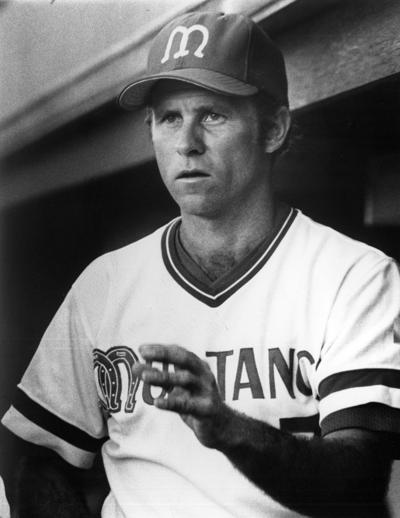
And next thing you know, I’m with Jimmy Hoff in extended-spring, and then I go to Greg Riddoch — two of the best managers that I’ve ever had. And Greg was great. And like I said, he just had a way about him.
The next coach I had — I had Jimmy Hoff for Tampa, and then I had a couple other coaches, and they were just different than Greg, you know what I’m saying? Just different.
JH It’s funny how many times I hear Plaza’s name come up and Chief Bender’s name come up. And it seems like it’s amazing that you guys survived being with them.
MD Yeah.
JH Because apparently they basically — Plaza especially — were abusive.
MD Yeah!
JH I mean, just way over-the-top abusive. Worse than, okay, you’re a lousy ballplayer. I’m going to chew on you for a while. It was rage, almost.
MD Yeah, he did a lot of other stuff too that I watched and saw. And like I said, this is my first year. I’ve never been out of New Jersey. And then I’m looking at this, thinking: man, oh man!
And then there was this guy named Scott Breeden. He was a pitching coach. I liked that guy. He was a nice guy. But I didn’t see much of him. He was basically with the pitchers.
Being in Oregon was an adjustment in several ways for Mickey:
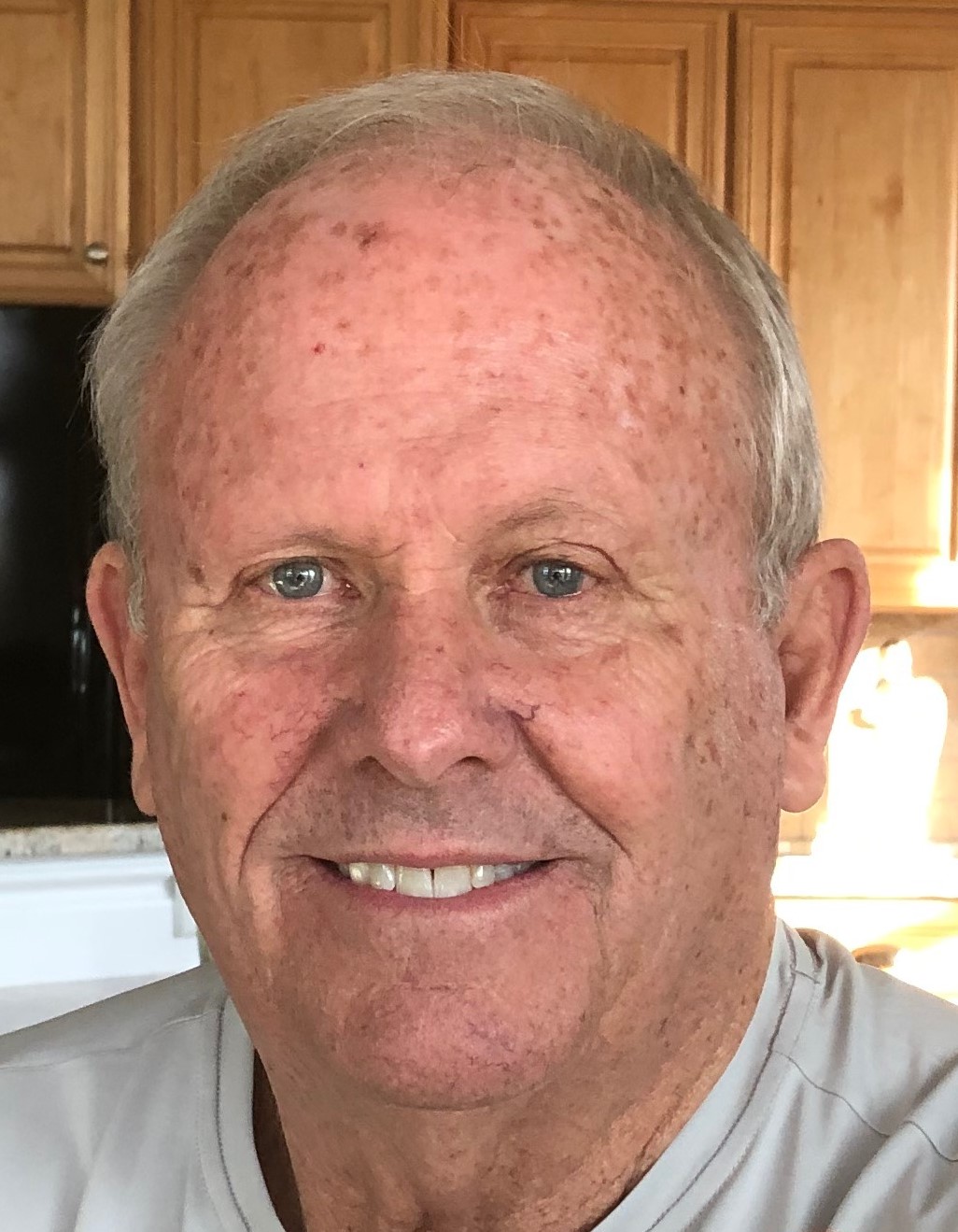
MD Now I’m going all the way from New Jersey to Florida to Oregon. I don’t know what’s out in Oregon. And well, when I saw Greg, Greg just made me feel like, hey, it’s going to be fun. And like I said, the guys — for some reason, it wasn’t dog-eat-dog, like in high school. Like, you know, people in the stands saying, oh, I hope he breaks his leg, so my kid can get in there. It wasn’t like that. It’s like if you’re out there, I was out there, or I was on the bench: Hey, I hope everybody does good; let’s just win.
And it worked out pretty good, I think.
JH It’s a real unusual point about this team, how everybody was pulling for each other and the guys on the bench weren’t — at least not outwardly — jealous of the guys who were playing. And that when the roles were reversed, it was a unit. It really seems to still be that way. And why else would guys still be getting together, 40 years after it happened?
MD And just, like I said, it was fun.
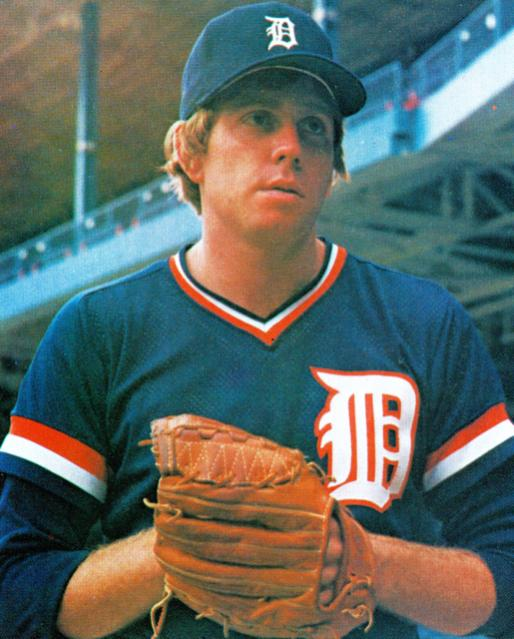
And you remember Larry Rothschild? I never chewed tobacco or smoked cigarettes at all. And Larry Rothschild gave me some Red Man one day before the game. I get so sick! He says, just drink water! They’re laughing at me: Drink water! Drink water! I went out and played that game; I actually got a couple of hits, but I was like, oooooh!
JH Dizzy?
MD Yeah! Yeah. That’s the first time I ever did it. Then I did it for — what? 20 years straight? Then I just stopped.
MiD Stopped before we dated. I knew him, but we weren’t dating yet.
MD I just said, I’ve had it. I’m done.
JH Did it give you a little kick during the game? Is that –
MD No, it didn’t do anything for me. It was just, it was cool, I guess. I don’t know. No, it didn’t do anything for me, really.
JH So Greg communicates without being abusive. He knows the game. He can teach players in a way that they can absorb it.
MD In a good way. Not in a mean way. But yet —
JH Not a fear-based approach to coaching.
MD Yes. Yeah. But you’re listening to him, because he knows what he’s talking about. I still text him and call him once in a while, because that’s what I do now. I’m a hitting instructor.
JH I heard you were doing your own thing.
MD Yeah. And I do that, and when I have a little thing I need to ask him, I’ll text him.
The last time I texted him, I said, Hey, what is this launch-angle crap?
JH Oh, no! [laughter]
MD Well, right. I said, okay, so it’s no good, right? Just stay away.
JH Heaven help, anymore, you were a line-drive hitter, because they want you to put the ball in the air.
MD You know, I’m thinking about this. If I was playing now, I probably wouldn’t have made it. Because basically I was left-handed, threw right-handed, but I taught myself to hit to the opposite field all the time, because of my speed. And get-on-base, get-on-base; steal; doubles, triples, you know, stuff like that.
But now, that ain’t gonna get you anywhere.
Good defense, good arm, good speed. But now it’s, you gotta hit the ball 500-something feet. Strikeouts are really crazy now. I mean, they go up, they’re up, like, unbelievable.
And like I said, so I told Michelle, I probably wouldn’t have made it that far, just by the way I was at that time in life.
JH You made it as far as AAA — you worked your way up, and made it as far as Indianapolis.
It looks like the years were kind of up-and-down with the bat. Was that adjusting to a higher level as you moved up?
MD Yeah.
After the 1978 MLB season, the Reds played a series of exhibition games in Japan. It ended up being a golden opportunity for Mickey, and a career highlight.
MD In 1978, the Nashville Sounds [AA] brought me to extended-fall baseball in Tampa, Florida. And I did get to play with the big club for a month, but it was in Japan.

JH Oh, I remember that tour. That was the tour where they fired [Reds manager] Sparky Anderson when it was over?
MD Yeah.
JH They let him go on the tour, got him all the way home, and said, Oh, by the way …
MD Yeah. Yeah. When I was in Tampa, I was crushing it. I mean, doing real good, you know, cause I had a good year in AA, and then they said, do you feel like going to Japan? Geronimo [the Reds’ center fielder] can’t make it. And I go, yeah, I’ll go. So they took me. So that’s why I got to play with the big club.
That was my major-league experience, to me: playing with those guys in Japan. — Mickey Duval
JH How was that month?
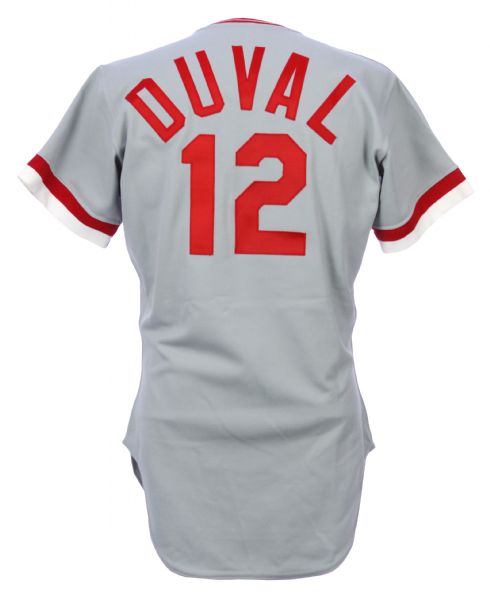
MD Oh, my God! [laughs] I tell you — you know, I got $9,000 for that month? I was only making $850 a month! I still remember, I still got the check. I got the stub, and I showed it to Michelle: $6,660-something dollars that I cleared. And I’m like, whoa! this is great! I just did that, I just did that. I want to make more, now. You know?
JH Did you feel like you could hang with those guys, after spending a month with them?
MD Oh yeah!
JH You thought, okay, I can do this?
JD I didn’t get to play much, you know, because of that, but I got to play a couple of times. Yeah. Yeah. I knew I could have [played with the big club]. I could throw just as hard as them, run just as fast as any of them. I didn’t have the power, but I could still keep up with them.
Michelle brought out some pictures that I had of me and a couple of guys — Rose and those guys. But I do have Pete Rose’s pants that I took in spring training one day; I said, I want to take something, at least, and Geronimo’s shirt. But I gave it to my son.
Mickey was one step from the big leagues in 1979. But one play changed all that.
JH So you go to AAA Indianapolis in 1979. What happened after that? How come it didn’t –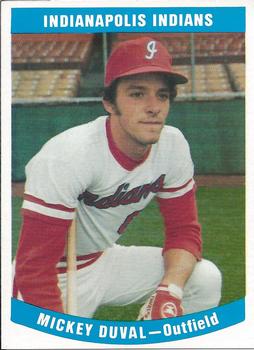
MD I was in Denver, Colorado, and I was going back — I was playing center field and was going back for a ball, hit the wall and I just — something happened to my shoulder. I don’t know what happened to it. So I couldn’t throw anymore.
So I tried to teach myself to throw left-handed.
JH Oh, wow.
MD I actually can throw left-handed if I want to, now. But it just still — I just couldn’t throw anymore. And I had a hard time extending my arm.
My average in Indianapolis was really good until that happened, and then it just went right down the crapper.
And then after that, I go down to AA, and my arm’s starting to still get a little sore. After I got to Tampa [A], I did pretty good. But then, I just kinda like said to myself, you know something? It’s time for me to get another job.
JH How tough was that to deal with?
MD I gave it my best, so it didn’t bother me. You know what I’m saying? I look in the mirror and say, I gave it my best shot. I have no regrets. So it really didn’t bother me.
JH That’s unusual.
MD Yeah, that’s what people say. But when I went — started going down to AA, single-A, and now you’re out, the next thing I just say to myself, you know something? I’m 25, 26 years old. Do I have to stay here and try to do that?
JH Well, you’re 25 years old in A-ball. You’re a prime candidate to get cut at any moment, anyway.
MD Yeah. And I just didn’t want to go through that. So I went and got a job at UPS.
JH How did that work out?
MD 21 years! I retired from [them], yeah.
JH [Making fun of UPS slogan] So that’s what Brown did for you.
MD That’s what Brown did for me! [laughs]
And then people would keep asking me to do hitting lessons in the neighborhood. A friend of mine goes, why don’t you do hitting lessons? You can make a couple bucks doing it. I said, I don’t want to do that. And Michelle goes, why don’t you do it? You know everything about hitting. Why don’t you just go give it a shot?”
And I said, okay.
So I called up Billy Lehman, when he was with the White Sox, and he asked me if I’d be a hitting instructor at the place that he has in New Jersey. I said, yeah, okay.
So Michelle conned me into it, and the first kid I got was — what was it?
MiD ADHD.
MD And I’m like, Hey, Hey, you know, and I’m joking around with this kid and having fun. I mean, he made the All-Star team.
JH So you turned him around!
MD Keep ‘em moving! So I do a little tee work first; a little soft-toss. A little one-hand drill. Then I start pitching to them. And I said, Hey, you know something? And then I watched a couple other hitting instructors before I really started getting into it. And I saw — these kids didn’t look like they are happy. It was too serious. So I got to a point — my father always told me, it’s gotta be fun.
So when I do all my hitting lessons now – for what, 15 years? — I joke, I have fun, and all my kids can hit; every one of them.
JH Is your business strong? Are you getting word-of-mouth, and that kind of thing?
MD That’s all I get is word — I do like 25 lessons a week. And we’ve got the Little Rays team organization. It’s a Little League thing that one of the guys runs. And we help him out a little bit and stuff like that.
And all the kids have fun. I mean, everybody, I joke with them, you know what I’m saying? I make fun of them sometimes. I make fun of myself sometimes, you know, and they just — they love it.
And yet they –
JH They do the work.
MD Yes! Yeah. Instead of going, what’s wrong with you? And you know, some of these kids are never gonna make even high-school ball.
JH But if they put the work in, and you know they love it –
MD Yeah. I show them a picture of me when I was 13, 14 years old. I was the smallest one on the team. I say, see? look at my arms. They were no bigger than my wrist. Look where I went. And these little, small kids [think] Oh yeah! Okay.
I just had little Parker Reese hit a home run. They just texted me the video. Yeah, he’s about this high, and he’s been hitting the fence. He says, I keep hitting the fence, Mr. Mick. And I say, I see you. Just keep hitting the fence. Don’t worry about that. And his Mom just texted me this morning: popped one over the fence. So I’m more proud than he is.
JH And he’ll remember that forever.
MD Oh heck yeah!
JH First time that ball went over, and you helped them get there. And it’s almost as good as doing it yourself.
MD And I’m feeling great! I’m like, tell him I said, ‘congratulations, that’s great. And don’t think of trying to hit another one. Just keep hitting the ball.’
I don’t want him to — and when I see Parker when I get back, and I’ll say now, what did you do the second time, after that home run? What’d you do? Don’t tell me you struck out, because I will be pissed.
Oh, Mr. Mick, I tried – I know what he’s gonna say, you know? [laughs]But I always ask them that, all the time. I say, what did you do? [laughter]
Because they know — I always tell every one of my kids now, have you hit a home run? Because they say, oh, I almost hit one. [And I tell them] If you hit one, forget you ever hit it, and you just keep doing what you’re doing. Because next thing you know, they’re trying to lift it now; they’re trying to overswing. I said, don’t make me make fun of you. I’ll make fun of you in front of Dennis and the other guy over here.
Many people will come in and they’ll say, Hey – they Google me and they say hey, is that you? Is that you? And I go, yeah, yeah, that’s me. And they want a picture. So now I gotta make up a picture or a baseball card. And I’m telling you, I have more fun doing this than I did playing.
Even though he’s a successful hitting coach these days, Mickey still remembers the influence his early managers had on his baseball career.
MD I think, what if I didn’t have those two coaches? I don’t know if you knew Jimmy Hoff. What a guy! I mean, I got along with him so great — he was such a nice guy. If I didn’t have him and I didn’t have Greg, I don’t what would have happened.
JH Did you feel like you got as much out of yourself as you could have? I mean, injuries slowed you down, stopped you. But you got to play with big-league guys and thought, I’m not a fish-out-of-water here. Can you look back at your career and say, you know, I did pretty well, all things considered?
MD Oh yeah. I had an article written about me when I was with UPS: No Runs, No Hits, No Errors, No Regrets. And I told [the author] the same thing: no, I gave it my best. I can look in the mirror, I gave it my best shot. I gave everything I had. So I’m happy with that.
JH Well, good for you.
MD I busted my butt to get where I had to get; no excuses. I have no regrets. And I never played another baseball game after that, but I did play softball. Slow-pitch, a long time. The little skinny guy got up, and people start walking in. They didn’t care, because I’ll hit it over the fence anyway. And Michelle was like, why are they moving in?
JH I bet it only happened once!
MD Yeah, and after that they knew who I was. I played a lot of softball, but then I started doing lessons, so I quit the softball and just stayed with doing my lessons.
JH Satisfied?
MD Oh heck, yeah. I love doing these – it’s fun.
JH Does it bother you not to have been able to get all the way to the big leagues?
MD No. Only because when I played with the big boys in Japan, that just made it right there. I got to where I wanted to get, so I was happy.
And like I say, I just think because of those two managers, I think that’s what started it all off. If I would’ve had two different managers, who knows what woulda happened. Because I was a happy person — kept to myself, but I was just a happy person. And I don’t know — you know, if I had someone like Ron Plaza, I probably would’ve gotten into a fight.
I’m proud of what I did. I am very proud of the way — especially when I got up to there [with the big club] and like, oh, you know, people will ask you, Oh, did you make it to the big leagues? And I said, I played with the big club for a month in Japan, you know?
And they say ohhhh! You know?
JH And they want to blow that off —
MD Yeah, I know. Then they ask, well, who was there?
Who was there? The Cincinnati Reds, Big Red Machine was there! That’s who I played with! And they’re like, Oh, well, you never made it to the big leagues. And I said, well, how far did you ever make it? I mean, people …
But then there’s people — and Michelle will attest to it — there’s people who are really good at asking you about it, and they’re happy that you did it. But the ones that aren’t, they’re just the ones who are frustrated that they didn’t make it, you know?
JH That’s why, if you feel like you got the most out of it — if you’re okay with what you did — and you’ve got six years of playing in there, that’s way beyond — there’s all kinds of reasons why guys don’t make it: injuries, other things, politics. Because you know there’s guys who made the big leagues who didn’t belong there, and you played with those guys and you know, in your heart, I’m okay. I’m right there.
MD Yeah. And my father said, if you’re honest with yourself, you know who’s better than you, and you know who’s not. And when you find that someone, then you gotta try and just reach that goal.
And he always told me, you don’t want to have somebody get hurt. You don’t want to have somebody to do bad. You want that person to be good, cause that’s the person you want to beat. You know what I’m saying?
Beat him at his best. Don’t sit there and hope he strikes out. No. Just, whenever he does, you just got to do better. So I never wished any anything ill on somebody so I could get in there, and stuff like that.
No, it’s just — I get in there, I gotta do my best. And it just so happens I did my best for six years, and that was better than any college I would’ve gone to. I learned more about life with baseball than I would’ve going to college. That’s like a degree right there.
And I guess I had some good coaches, and I wouldn’t give that up. I would do it all over the same way, just like that. Same thing. Wouldn’t change a thing.
Excerpted from my book, The Little Red Wagon: The 1975 Eugene Emeralds.

